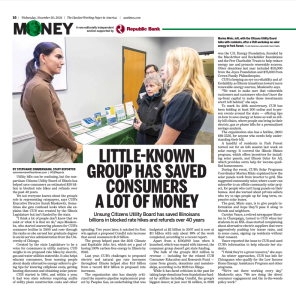By Stephanie Zimmerman
Chicago Sun-Times
Utility bills can be confusing, but the nonpartisan Citizens Utility Board of Illinois has helped save consumers an estimated $20 billion in blocked rate hikes and refunds over the past 40 years.
Yet not everyone knows about the group’s role in representing ratepayers, says CUB’s Executive Director Sarah Moskowitz. Sometimes she gets confused looks when she explains that CUB was created by the Illinois Legislature but isn’t funded by the state.
“I think a lot of people don’t know that we exist or what it is that we do,” says Moskowitz, who started answering phones for CUB’s consumer hotline in 2000 and rose through the ranks as she earned her graduate degree in social service administration from the University of Chicago.
Created by the state Legislature to be a voice for consumers in utility matters, CUB weighs in on proposed rate hikes by electric, gas and water utilities statewide. It also helps educate consumers, from warning people about shady alternative energy sellers to giving tips for lowering cellphone costs, getting heating discounts and obtaining solar power.
CUB started in 1984, and within a year, it had won state reforms requiring audits of utility plant construction costs and other spending. Two years later, it notched its first win against a proposed ComEd rate increase that saved consumers $1.9 billion.
The group helped pass the 2021 Climate and Equitable Jobs Act, which set a goal of having 100% carbon-free energy in Illinois by 2045.
Last year, CUB’s challenges to proposed electric and natural gas rate increases throughout Illinois helped slice $1.6 billion from a record $2.9 billion in proposed rate increases.
The organization also has sharply criticized the massive pipeline replacement project by Peoples Gas, an undertaking that was budgeted at $2 billion in 2007 and is now at $11 billion with only about 38% of the work completed, according to a recent report.
Apart from a $100,000 loan when it launched, which was repaid with interest, the consumer group doesn’t get state funding.
The bulk of the group’s $2.2 million in revenue — including for the related CUB Consumer Education and Research Fund — came from grants, donations and memberships, according to its 2023 tax filings.
While it has faced criticism in the past for taking large donations from foundations funded by utilities including ComEd, the group’s biggest donor, at just over $1 million, in 2023 was the U.S. Energy Foundation, founded by the MacArthur and Rockefeller foundations and the Pew Charitable Trusts to help reduce energy use and promote renewable sources. Other donations last year included $115,000 from the Joyce Foundation and $75,000 from Crown Family Philanthropies.
CUB is keeping an eye on reliability and affordability as Illinois transitions toward more renewable energy sources, Moskowitz says.
“We want to make sure that vulnerable customers and customers who don’t have the up-front capital to make those investments aren’t left behind,” she says.
To mark its 40th anniversary, CUB has been holding at least 300 online and in-person events around the state — offering tips on how to save energy at home as well as utility bill clinics, where people can bring in their electric, gas or phone bills for a personalized savings analysis.
The organization also has a hotline, (800) 669-5556, for anyone who needs help understanding their bill.
A handful of residents in Park Forest turned out for an info session last week on solar energy. It covered the Illinois Shines program, which offers incentives for installing solar panels, and Illinois Solar for All, which provides extra help for income-qualified homeowners.
During the event, CUB’s Solar Programs Coordinator Marina Minic explained how the solar panels work from inverter to grid. She suggested community solar, where a user can subscribe to an offsite community solar project, for people who can’t hang panels on their homes. And she warned about private sellers who try to sign people up for long term, expensive solar leases.
The goal, Minic says, is to give people information and hope they’ll pass it along to friends and neighbors.
Carolyn Vance, a retired newspaper librarian in Champaign, turned to CUB when her students in an ESL class started complaining about alternative electric suppliers that were aggressively pushing low teaser rates, and in some cases, signing up residents without their consent.
Vance reported the issue to CUB and used CUB’s information to help educate her students.
“I think they’re a great resource,” she says.
As winter approaches, CUB has info for Chicagoans who qualify for the Low Income Home Energy Assistance Program and other programs.
“We’re out there working every day,” Moskowitz says. “We are doing the direct consumer engagement and the in-the-weeds policy work.”


